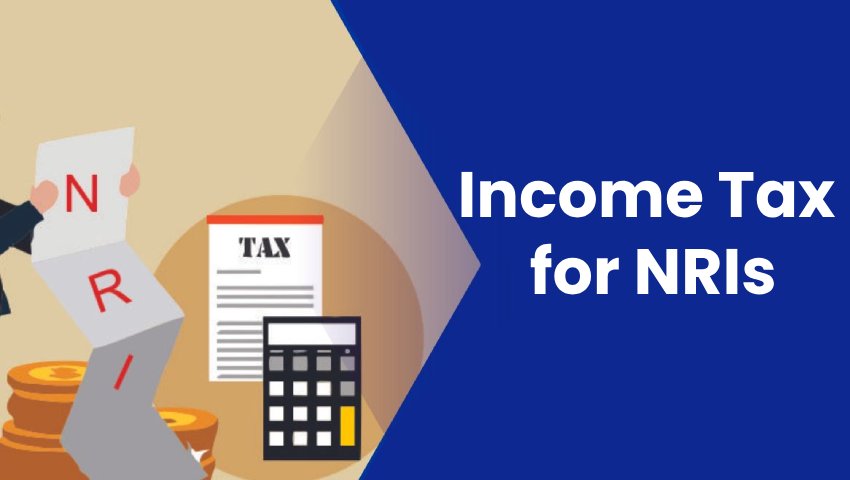
- 03/06/2025
- MyFinanceGyan
- 768 Views
- 1 Likes
- Tax
Income Tax for NRIs: A Simple Guide
Taxes are the foundation of India’s economy, and the rules for Non-Resident Indians (NRIs) are different from those for resident Indians. This guide explains how NRIs are taxed in India, what income is taxable, deductions they can claim, and how to avoid double taxation.
Who is an NRI?
Your residential status determines whether you are taxed as an NRI or a resident.
Conditions to be a Resident:
You are a resident if:
- You stay in India for 182 days or more in a financial year (April–March).
- You stay in India for 60 days or more in a year and have stayed for 365 days or more in the last 4 years.
Exceptions:
- If you are an Indian citizen working abroad or a crew member on an Indian ship, only the 182-day rule
- If your Indian income (excluding foreign income) exceeds ₹15 lakh, the 60-day rule becomes 120 days.
If you do not meet these conditions, you are an NRI.
Resident but Not Ordinarily Resident (RNOR):
You are an RNOR if:
- You were a non-resident in India for 9 out of the last 10 years, or
- You stayed in India for less than 729 days in the last 7 years.
New Rule (2020):
If an Indian citizen or Person of Indian Origin (PIO) has:
- Income in India over ₹15 lakh (excluding foreign income),
- Stays more than 120 days but less than 182 days in India,
- Stays 365+ days in the last 4 years,
- then they are RNOR (not NRI).
Deemed Resident Rule (2020):
If an Indian citizen earns more than ₹15 lakh from Indian sources and does not pay tax in any other country, they will be considered a deemed resident (RNOR).
Is Foreign Income Taxable for NRIs?
- Residents pay tax on global income.
- NRIs pay tax only on Indian income.
Taxable Income for NRIs:
- Salary earned in India or for services rendered in India.
- Rental income from property in India.
- Interest from NRO accounts (NRE & FCNR interest is tax-free).
- Capital gains from selling property, shares, or assets in India.
- Business income from India.
Example:
- Pooja, an NRI, earns ₹70,000 as interest from her NRO account. Since her income is below ₹2.5 lakh, she doesn’t owe tax but must file a return to claim a TDS refund.
Do NRIs Need to File an ITR?
Yes, if their Indian income exceeds ₹2.5 lakh. The last date is July 31 (unless extended).
Advance Tax for NRIs:
If tax liability exceeds ₹10,000, NRIs must pay advance tax in installments (June, September, December, March).
Taxation of Different Incomes for NRIs:
Salary Income:
- Taxable if earned in India or services provided in India.
- Example: If an NRI works remotely for an Indian company, salary is taxable in India.
Rental Income:
- Taxable if the property is in India.
- Deductions allowed:
- 30% standard deduction
- Home loan interest
- Property tax
- Principal repayment (under Section 80C)
TDS on Rent:
- Tenant must deduct 30% TDS on rent paid to NRI landlords.
- They must file Form 15CA & 15CB (if rent exceeds ₹5 lakh/year).
Interest Income:
- NRO account interest: Fully taxable.
- NRE & FCNR interest: Tax-free.
- Fixed deposits (FDs): Taxable
Capital Gains:
- Short-term capital gains (STCG): Taxed at 15% (shares) or as per slab rates.
- Long-term capital gains (LTCG): Taxed at 20% (with indexation).
- Exemptions:
- Section 54: Reinvest in a new house.
- Section 54EC: Invest in bonds (REC, PFC, IRFC).
Special Investment Income:
- If an NRI earns from Indian shares, debentures, or government securities, tax is 20%.
Deductions Available for NRIs:
Section 80C (Up to ₹1.5 lakh):
- Life insurance premium.
- Home loan principal repayment.
- Tuition fees for children.
- ELSS mutual funds.
Not Allowed: PPF, NSC, SCSS (for new NRI accounts).
Section 80D (Health Insurance):
- Self/family: ₹25,000 (₹50,000 for senior citizens).
- Parents: ₹25,000 (₹50,000 if senior).
Section 80E (Education Loan Interest):
- No limit.
- Available for 8 years.
Section 80TTA (Savings Account Interest):
- Deduction up to ₹10,000.
Deductions Not Allowed for NRIs
- Section 80DD, 80DDB, 80U (for disabled dependents).
How NRIs Can Avoid Double Taxation?
India has Double Tax Avoidance Agreements (DTAAs) with many countries. NRIs can:
- Exemption Method: Pay tax in only one country.
- Tax Credit Method: Claim credit in the resident country for taxes paid in India.
Key Takeaways:
- NRIs pay tax only on Indian income.
- File ITR if income > ₹2.5 lakh.
- TDS applies to rent, capital gains, and interest.
- Claim deductions (80C, 80D, 80E).
- Use DTAA to avoid double taxation.
By understanding these rules, NRIs can efficiently manage taxes and avoid penalties. Always consult a tax expert for personalized advice.



